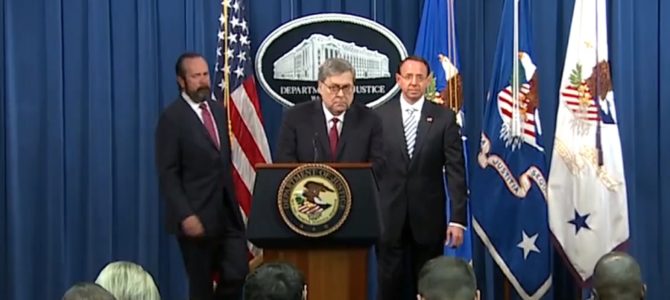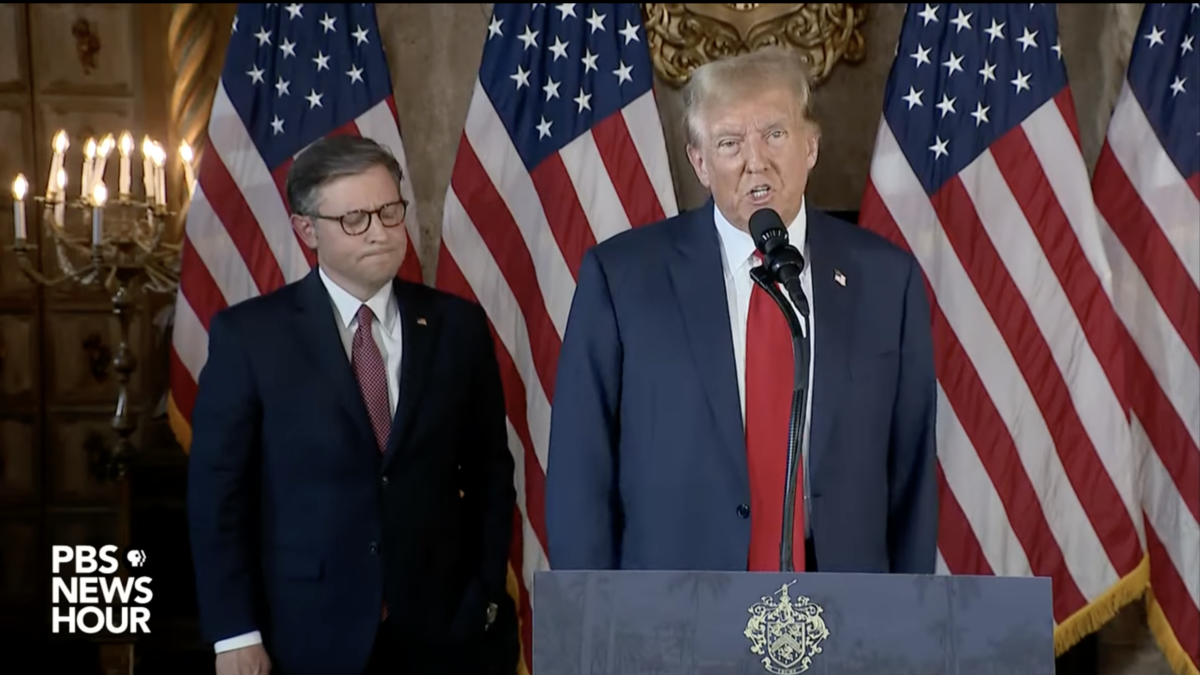
After two years and spending an estimated $35 million, Robert Mueller issued a 448-page report that ignored the governing special counsel regulations. Those regulations required Mueller, at the conclusion of the special counsel’s work, to “provide the Attorney General with a confidential report explaining the prosecution or declination decisions reached by the Special Counsel.”
Yet, instead of issuing the mandated closing documentation, Mueller explained that his team “determined not to make a traditional prosecutorial judgment” of whether “to initiate or decline a prosecution.”
Attorney General William Barr spoke during today’s press conference of Mueller’s failure to perform this regulatorily required duty. When asked why he and Deputy Attorney General Rod Rosenstein felt it necessary “to take it to the next step to conclude there was no crime,” Barr retorted:
The very prosecutorial function and all our powers as prosecutors, including the power to convene grand juries and compulsory process that’s involved there, is for one purpose and one purpose only. It’s to determine yes or no, was alleged conduct criminal or not criminal. That is our responsibility and that’s why we have the tools we have. And we don’t go through this process just to collect information and throw it out to the public. We collect this information. We use that compulsory process for the purpose of making that decision. And because the special counsel did not make that decision, we felt the department had to. That was a decision by me and the deputy attorney general. Yes.
Notwithstanding Mueller’s professed refusal to render judgment on whether to initiate or decline prosecution, Part 2 of the special counsel’s report served solely to indict President Trump in the court of public opinion by providing detailed factual conclusions that seemingly support obstruction of justice charges—at least based on the special counsel’s view of the law.
But Mueller’s view is decidedly wrong. Prior to his appointment, Barr decimated the obstruction of justice theory of criminal liability Mueller relies upon in the special counsel report.
Further, while Democrats and the media will put Barr’s view down to bias, Deputy Attorney General Rosenstein agreed with those conclusions. Rosenstein, who supposedly floated the 25th Amendment as a basis to out the president, is anything but biased in favor of the president. Rosenstein appointed Mueller, and Rosenstein, who flanked Barr during the press conference, agreed with Barr’s conclusion that no crime had occurred.
Many believe lead special counsel prosecutor Andrew Weissmann instigated the non-indictment indictment of Trump in Mueller’s report. The modus operandi is just too perfect.
Recall that Weissmann led the Enron task force and served as the lead prosecutor in the Department of Justice’s case against Arthur Anderson. Weissmann secured a conviction against the former accounting giant, shuttered the firm, and left tens of thousands of innocent employees without jobs. Then, “three years later, the Supreme Court reversed the Andersen conviction in a unanimous decision, holding that Andersen’s conduct was not criminal, and it ‘was shocking how little criminal culpability the jury instructions required.’”
Weissmann’s attempts to convict Merrill Lynch executives of non-crimes were likewise swatted down in court. And then there was Weissmann’s questionable conduct during those trials, which emails indicate included threatening witnesses.
Even if Weissmann holds responsibility for pushing to include the obstruction of justice analysis, Mueller approved the final report that pontificated on Trump’s potential criminal conduct, while refusing to make a decision to initiate or decline charges. Ironically, in justifying his non-decision, Mueller claimed any other outcome would be unfair to the president. From the special counsel’s report:
We determined not to apply an approach that could potentially result in a judgment that the President committed crimes. Fairness concerns counseled against potentially reaching that judgment when no charges can be brought. The ordinary means for an individual to respond to an accusations is through a speedy and public trial, with all the procedural protections that surround a criminal case. An individual who believes he was wrongfully accused can use that process to seek to clear his name. In contrast, a prosecutor’s judgment that crimes were committed, but that no charges will be brought, affords no such adversarial opportunity for public name-clearing before an impartial adjudicator. The concerns about the fairness of such a determination would be heightened in the case of a sitting President, where a federal prosecutor’s accusations of a crime, even in an internal report, could carry consequence that extend beyond the realm of criminal justice.
But Trump has no process now to clear his name from the taint of obstruction of justice created by Mueller’s report. So, after two years of battling unjust and untrue charges of collusion with Russia, Mueller has destined President Trump to spend the second half of his first term combating claims of obstruction of justice—claims which, even if they had a basis in fact, have no basis in law.









